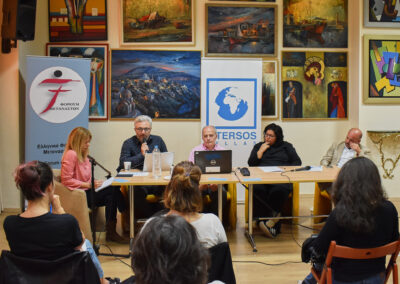A new report presented by INTERSOS HELLAS in cooperation with HIAS Greece and the Greek Council for Refugees entitled:‘Being Hungry in Europe: An Analysis of the Food Insecurity Experienced by Refugees, Asylum Seekers, Migrants, and Undocumented People in Greece’ reveals the evidence met during the implementation of the Food for All project. The report findings were analyzed during the press conference held in Athens on May 15th.
Most notably, the data collected through the Food for All project (FfA) implemented by INTERSOS HELLAS in cooperation with the Greek Forum of Migrants (GFM) since December 2021, constitute the backbone of the report, which presents evidence of massive food insecurity affecting migrants, refugees, asylum seekers and undocumented people in Athens.
According to the report:
- 30,1% of those who received assistance through the FfA project hold the legal status of a recognized refugee.
- Most individuals who benefited from the FfA project (54%) are children, of whom 1 out of 3 (23.7%) are under 4 years old.
- 59.4% access food only 1-3 times per week.
“Once per week they give milk to children, food in the yellow line [food provided by an NGO]. That was good in the beginning but it’s no longer. I am putting my baby to sleep hungry” –
“A” (23 y.o.), mother of 3 children, Lesvos island, 2022.
“The most vulnerable population, children and women, are the ones in dire need of the food aid provided through the Food for All project. The lack of sufficient and nutritious food during early childhood has serious long-term negative implications on children’s physical and cognitive development. The interconnection between food insecurity, poverty and social marginalisation should be acknowledged. The development of cumulative, integrated, and complementary policies to address the essential nutritional needs of the people is urgent“. Dr. Apostolos Veizis, General Director of INTERSOS HELLAS.
‘’The existence of systemic barriers, such as the complex and lengthy bureaucratic procedures coupled with the application of discriminatory criteria that de facto exclude beneficiaries of international protection and migrants from most social benefits in Greece, severely hinder the equal access to the social welfare system for third country nationals. Meanwhile, reception conditions for asylum seekers in the camps remain substandard’’. Vassilis Kerasiotis, Country Director of HIAS Greece.
“We welcome the opportunity to raise yet another issue faced by the population GCR has pledged to support. We see it as part and parcel of the same policy approach pursued in Greece vis-à-vis people seeking asylum, who are faced with violence at the borders, isolation in prison-like camps and systematic barriers to protection and integration, which come at the detriment of the Greek society as well. Particularly given that food insecurity affects broader segments of the Greek society, the issue must be addressed in an inclusive manner, for the benefit of all”. Lefteris Papagiannakis, Director of the Greek Council for Refugees (GCR).
After disclosing the presence of systemic gaps and barriers which hinder equal access to the social welfare system, the report ultimately suggests recommendations based on the analysis of best practices from EU member states and the recommendations made by the European Commission.

The project aims to address the basic needs of the most vulnerable groups of migrants and refugees residing in Athens and to assist in reinforcing their food security. The Food for All initiative is part of the “Feeding for Migrants/Refugees” program of the Greek Forum of Migrants – GFM and INTERSOS HELLAS supported by the Stichting Vluchteling – SV Foundation.






